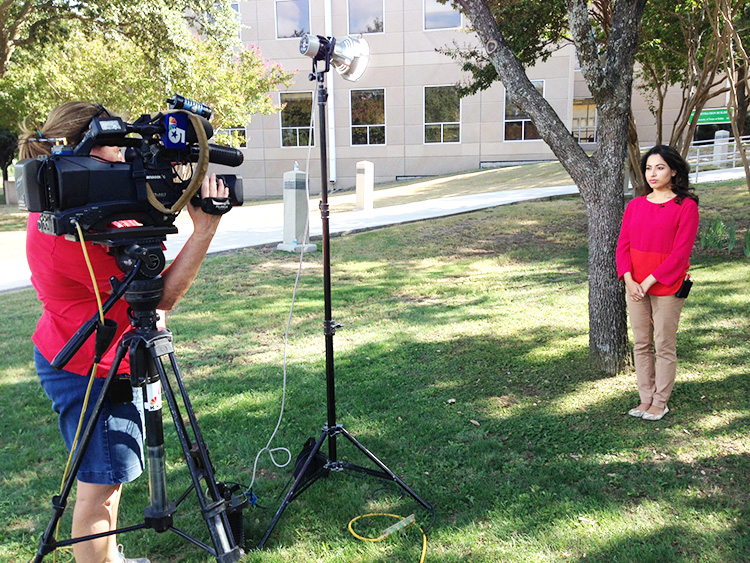
Dr. Seema Yasmin
Physician and multidisciplinary researcher Dr. Seema Yasmin recently joined the faculty of UT Dallas as a professor in practice in addition to her new role as a staff writer at The Dallas Morning News.
At UT Dallas, Yasmin teaches classes on public health topics and provides mentorship for young women who are pursuing degrees in the sciences.
She covers public health for The Dallas Morning News, and has written stories on issues including immigration and the deadly Ebola virus.
“What motivates me is translating science and research into a form everyone can enjoy,” Yasmin said. “People have an interest in public health, and it touches so many aspects of life.”
Yasmin’s teaching and reporting duties have recently expanded to include educating a national and worldwide audience during news coverage of Ebola in Dallas. She has provided expert commentary during interviews with CNN, MSNBC and others, where she has discussed the spread of the disease and how the Centers for Disease Control and Prevention manages such outbreaks.
Yasmin served as a disease detective in the Epidemic Intelligence Service at the CDC in Atlanta. She earned her medical degree from the University of Cambridge and has worked in Botswana and Kenya as well as England.
Her interest in public health and medicine began before she embarked on her undergraduate degree. She worked as a volunteer for an HIV organization focused on the needs of teenagers affected with the disease.

An NBCDFW videographer and Yasmin prepare for a live segment on the Ebola case in Dallas. Yasmin has appeared on several television and radio broadcasts to discuss the virus.
“That experience really got me interested in the social side of medicine,” Yasmin said. “I could see the difficulties and prejudices patients faced.”
After her medical training, she worked as a physician at Homerton University Hospital outside London. Then she came to the United States to focus on epidemiology at the CDC.
During her time there, she studied disease outbreaks including the West Nile virus, whooping cough and botulism. She was deployed to Kenya as strategic advisor to the Kenya Ministry of Health and Kenya Medical Research Institute to evaluate a pediatric program aimed at reducing the incidence of HIV infection.
Yasmin’s academic experience includes work at the University of Arizona School of Public Health, where she designed curriculum and taught a course in applied public health practice.
Resident Ebola Expert
Dr. Seema Yasmin’s teaching and reporting duties have expanded to include educating a national and worldwide audience about Ebola in Dallas. She has given multiple news interviews to CNN, MSNBC and others about the topic where she has discussed the spread of the disease and how the CDC manages such outbreaks.
The following links are a sampling of her recent interviews:
Recent work for The Dallas Morning News:
Her role at UT Dallas will include teaching undergraduate classes on public health. Yasmin said she plans to incorporate topical issues that offer concrete examples of disease outbreaks and the efforts needed to contain them.
Dr. George Fair, dean of the School of Interdisciplinary Studies, said this is the first semester a public health course has been offered since the health care studies program began in 2012. As the program continues to grow — enrollment has topped 360 students this semester — Fair expects Yasmin’s involvement to generate further interest.
“Dr. Yasmin has been highly involved in the public health arena and can speak with great knowledge about issues like Ebola, vaccinations and West Nile virus,” Fair said.
He also said that Yasmin’s experiences are of great interest to students who want to pursue degrees in the medical field.
“Those who could not enroll for her class this semester are already inquiring about the spring course,” Fair said.
Yasmin is the first medical doctor to teach in health care studies at UT Dallas.
“The recent Ebola outbreak is a good example because it brings together geography, human behavior, basic science, politics and culture,” Yasmin said. “There are so many things that come together to tell the story of epidemics.”